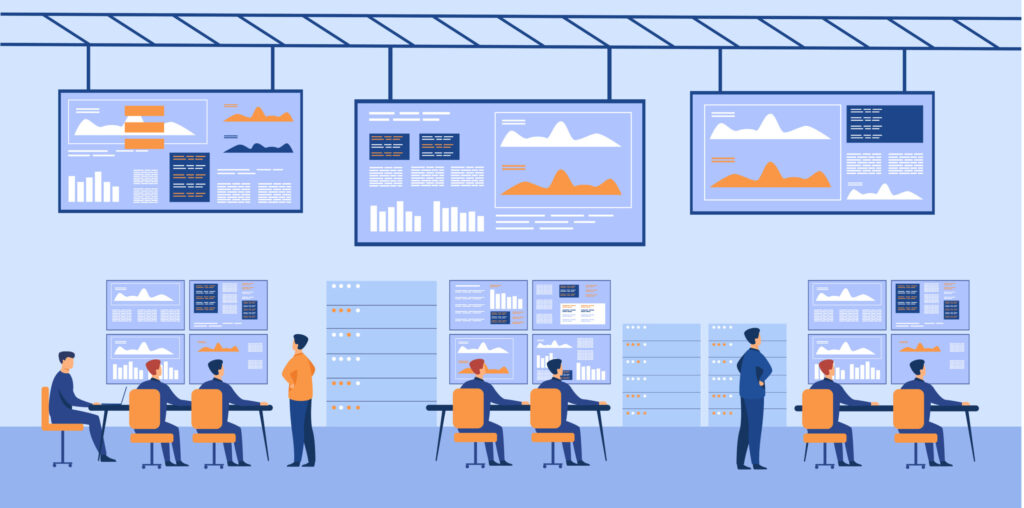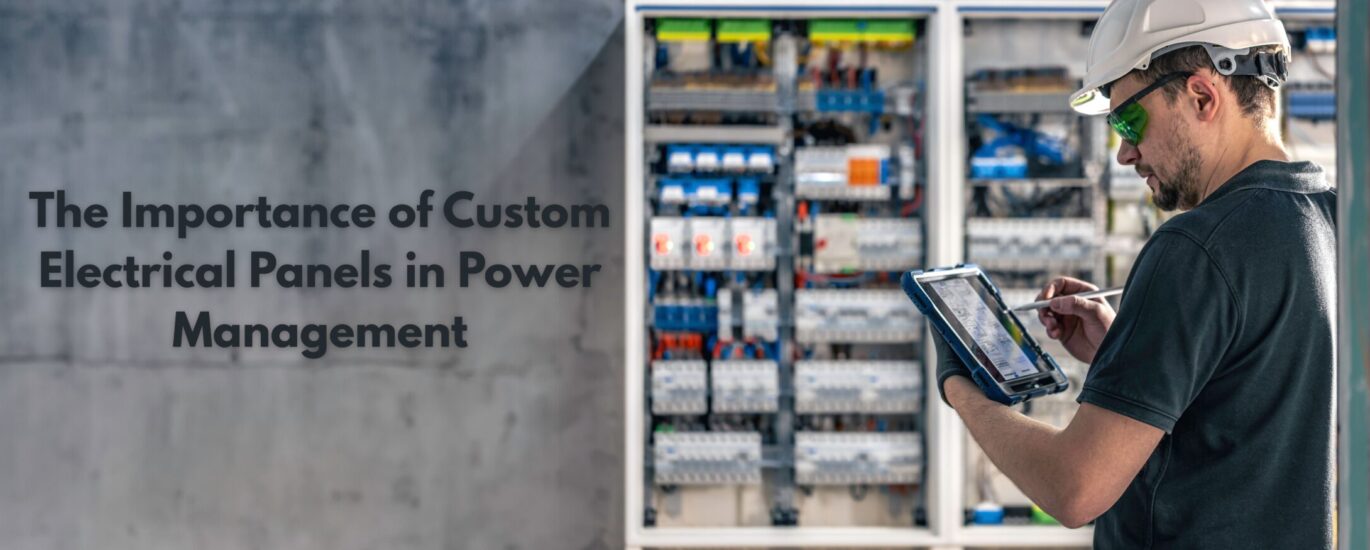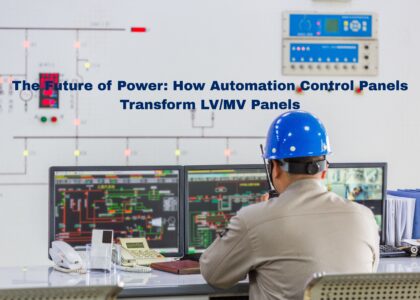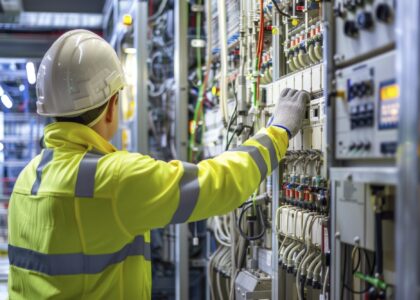In a world increasingly reliant on complex electrical systems, the efficiency, reliability, and safety of power management infrastructure have never been more critical. The electrical panel is one essential part of this infrastructure. While standard panels serve basic needs, industries today require more refined and efficient solutions. Enter custom electrical panels—the tailored power distribution solutions that offer unmatched control, flexibility, and safety.
From industrial manufacturing to data centers, healthcare facilities, and commercial buildings, custom electrical panels are becoming indispensable in meeting the unique demands of each environment. In this blog, we’ll explore how personalized panel configurations improve safety, enhance performance, and support future scalability, all while adhering to modern electrical control panel design standards.
Key Takeaways
1. For optimal performance, custom electrical panels offer configurations tailored to the industry.
2. These solutions improve safety and help comply with electrical codes and standards.
3. Custom panels enhance energy efficiency and system monitoring capabilities.
4. Thoughtful electrical control panel design enables easier maintenance and scalability.
5. Industries from healthcare to manufacturing benefit greatly from tailored power solutions.
Table of Contents
What Are Custom Electrical Panels?
Custom electrical panels are specially designed electrical distribution systems tailored to meet specific operational, environmental, and functional requirements. Unlike off-the-shelf panels, which are built to generic specifications, custom panels are developed based on factors such as voltage requirements, space limitations, safety standards, and user functionality.
They can include a variety of components such as breakers, relays, meters, communication ports, and automation controls—all arranged to streamline electrical control panel design for optimal efficiency.
Why Standard Panels Aren’t Always Enough?
Standard electrical panels are mass-produced with limited functionality and often lack the specific features that certain industries or operations require. Here are a few challenges they present:
1. Space Limitations: Not all buildings or production facilities have the same space availability.
2. Complex Electrical Loads: Complex systems require more than basic on/off switches.
3. Special Safety Protocols: Some sectors need stricter safety compliance.
Integration Issues: It’s possible that off-the-shelf panels won’t work flawlessly with automation or smart technology.
These shortcomings highlight the need for custom solutions built with advanced electrical control panel design.
Benefits of Custom Electrical Panels
Customizing an electrical panel is an investment in both safety and performance. Here’s how businesses benefit:
1. Optimized Layout and Functionality
Every wire, switch, and component is placed to maximize space, efficiency, and user accessibility.
2. Improved Safety and Compliance
Panels are built to meet or exceed local and international safety standards, reducing risk.
3. Integration with Automation Systems
Custom panels are compatible with smart monitoring tools, IoT systems, and PLCs (programmable logic controllers).
4. Reduced Downtime
A neatly arranged panel facilitates quicker and simpler maintenance and troubleshooting.
5. Enhanced Energy Efficiency
Proper design ensures optimized energy use and heat distribution, leading to cost savings.
Role of Electrical Control Panel Design
Design is at the heart of effective custom electrical panels. A good electrical control panel design considers:
1. Circuit Layout: Circuits are arranged logically to make maintenance easier.
2. Component Quality: Use of high-grade switches, relays, and breakers.
3. Panel Enclosure: Material and sealing based on environmental exposure.
4. Labeling and Wiring: Clear labeling and color-coded wiring for safety and efficiency.
5. Heat Management: Proper ventilation and cooling mechanisms.
Advanced CAD tools and simulation software are used during the design phase to ensure the panel performs as expected under all conditions.
Applications Across Industries
Custom electrical panels are not limited to one sector. Their applications span:
1. Manufacturing and Industrial Plants
Panels handle high loads and control complex machinery with precision.
2. Healthcare Facilities
Requires uninterrupted power and safety for sensitive equipment.
3. Data Centers
Demands strict energy management and fail-safe systems.
4. Commercial Buildings
Used for lighting control, HVAC systems, and power distribution.
5. Agriculture and Greenhouses
Tailored to automate irrigation, lighting, and temperature control.
Enhancing Safety Through Customization
Safety is non-negotiable in power management. Custom panels improve safety by:
1. Including emergency shutdown mechanisms
2. Adding surge protection and overload controls
3. Using fire-retardant panel materials
4. Preventing human errors through intuitive layouts and labeling
By adhering to a precise electrical control panel design, safety becomes a built-in feature rather than an afterthought.
Performance and Energy Efficiency
Custom electrical panels are engineered for optimal electrical performance:
1. Minimize energy loss through efficient component layout
2. Reduce operational costs with automated control features
3. Improve power factor and load balancing
With the inclusion of energy meters and real-time monitoring, companies can actively manage consumption.
Smart Technologies in Custom Panels
Modern custom electrical panels can integrate with smart tech to provide:
1. Remote Monitoring: Real-time access to panel data
2. Predictive Maintenance: Alerts before faults occur
3. IoT Integration: Connect to cloud platforms for analytics
4. Mobile Control: Manage systems from mobile apps
Such features are only possible when customization is paired with robust electrical control panel design.
Scalability and Future-Proofing
Industries evolve, and so should your power systems. Custom panels support:
1. Easy Upgrades: Add new components without replacing the entire system
2. Modular Design: Flexibility to reconfigure for changing needs
3. Future Compliance: Designed with future standards and technologies in mind
Reduced operational disturbance and less expensive long-term costs result from this.
Choosing the Right Panel Provider
Not all providers offer the same level of precision in custom design. Look for:
1. Proven experience in electrical control panel design
2. Industry certifications and compliance knowledge
3. Use of high-quality materials and technology
4. Post-installation support and documentation
Partnering with an experienced panel builder ensures the best ROI.
Final Thoughts

The way that industries handle power management has been completely transformed by custom electrical panels. With thoughtful electrical control panel design, these tailored solutions boost safety, improve operational efficiency, and pave the way for future innovations. As energy needs grow and technologies advance, investing in custom solutions isn’t just smart—it’s essential.
Whether you’re upgrading an old system or setting up new infrastructure, opting for custom electrical panels ensures your power systems are not only reliable but also future-ready.
Explore Our Custom-Built Control and Relay Panels
Looking for power solutions that perfectly align with your operational needs? Our Control and Relay Panels are professionally designed to meet the specific needs of your application. Designed with safety, performance, and scalability in mind, these panels form the backbone of reliable power management systems. Whether you’re in manufacturing, energy, or infrastructure, our tailored panels ensure uninterrupted control and streamlined electrical distribution.
FAQs
What are custom electrical panels?
Custom electrical panels are specially designed power distribution units tailored to meet specific operational, environmental, and safety requirements. They offer enhanced flexibility and performance compared to standard off-the-shelf panels.
Why should I choose custom electrical panels over standard ones?
These panels provide better adaptability, improved safety, and seamless integration with modern automation systems. They’re designed according to your facility’s unique needs, making them more reliable and efficient.
How does the electrical control panel design impact system performance?
Proper panel design ensures optimized circuit layout, component selection, ventilation, and user safety. A well-designed panel reduces downtime, prevents overheating, and simplifies maintenance.
Are custom electrical panels suitable for all industries?
Yes, custom electrical panels are used across various sectors, including manufacturing, healthcare, IT, agriculture, and commercial buildings. Each design is tailored to match the industry’s specific power demands and regulatory standards.
Can custom electrical panels help improve energy efficiency?
Absolutely. Thoughtful panel design minimizes energy loss, improves load balancing, and integrates monitoring systems to manage consumption effectively.
What factors are considered in electrical control panel design?
Key factors include voltage rating, circuit protection, space constraints, environment, component quality, thermal management, and regulatory compliance—all central to panel design.
Do custom panels support smart technologies?
Yes, most modern panels support IoT, PLCs, and real-time remote monitoring systems, enabling smart control and predictive maintenance.
How long does it take to build a custom electrical panel?
The timeline depends on the complexity of the panel design and specific client requirements, typically ranging from a few weeks to a couple of months.



